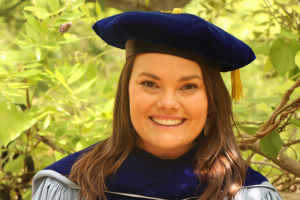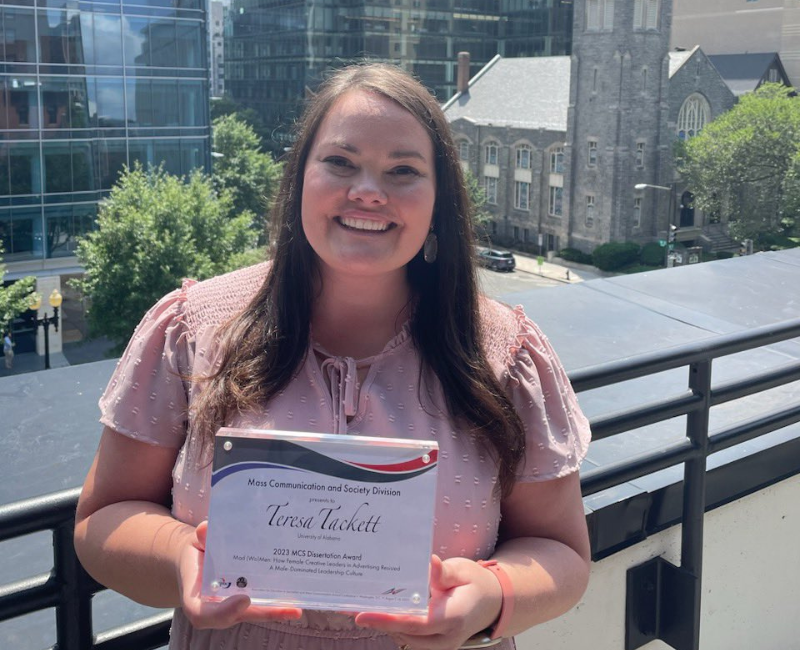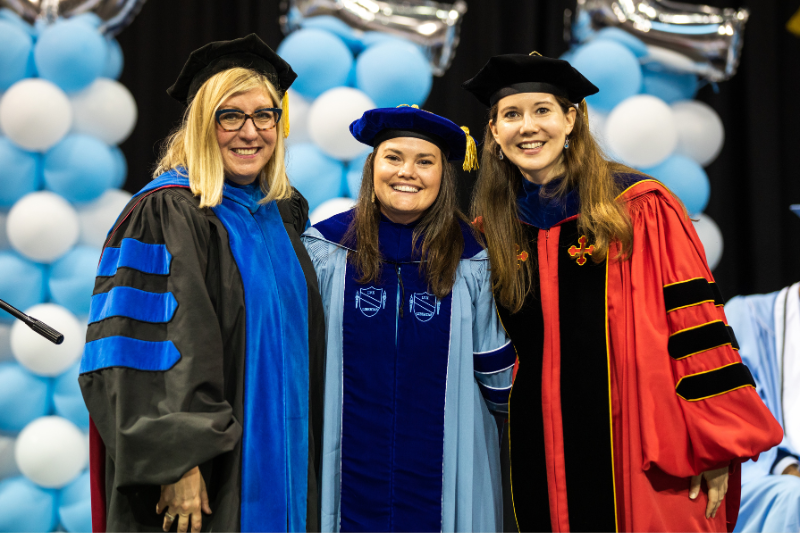Ph.D. alum wins dissertation award, promoting women and diversity in advertising

By Erin Wadsworth '22
The slogan “Diversity = Creativity = Profitability” is at the heart of The 3% Movement’s mission to eradicate gender bias in creative departments in U.S. advertising agencies.
UNC Hussman alumna Teresa Tackett ’22 (Ph.D.) explored this movement’s mission, focusing on how women negotiated their paths to creative leadership in her award-winning dissertation. She examined professional imbalances in the advertising industry in which 89% of people holding the title of “creative director” are men.
Tackett’s dissertation, “Mad (Wo)Men: How Female Creative Leaders in Advertising Resisted a Male-Dominated Leadership Culture,” was recognized with the 2023 Mass Communication and Society Dissertation Award from the Association for Education in Journalism and Mass Communication (AEJMC) in October 2023.

Tackett with her Mass Communication and Society Dissertation Award.
The research stemmed from her experience working with female leaders in the advertising industry.
“I’ve been mentored really well by wonderful women who are leaders,” said Tackett. “When I realized that wasn’t the case for everyone, it gave me a lot to think about.”
During conversations with leaders in the advertising industry, she noticed gender biases as a predominant factor when it came to leadership advancement, especially in creative departments. Long working hours that accompany advertising agencies and parental responsibilities were a common topic in those conversations, particularly for women who cited childcare and other household responsibilities they completed during their “second shift” after a day of professional work.
“That led me to think about gender bias in advertising and the industry itself,” Tackett said. “Who gets to be leaders, and why? What are the workplace policies and procedures for career advancement in creative departments, and who gets to decide that?”
Early in her graduate career, she discovered the advocacy work of The 3% Movement, an organization created in 2012 to address gender bias among creative leaders in the industry. At that time, only 3% of creative directors in American advertising agencies were women. By 2020, that number increased to 29%.
Despite progress, the number plummeted back down to 11% in 2021. This dramatic change happened during Tackett’s time in UNC Hussman’s Ph.D. program, which coincided with pivotal societal issues including the COVID-19 pandemic, the Black Lives Matter movement and the Great Resignation. The zeitgeist elevated issues related to inclusion and belonging in the workplace that dovetailed with The 3% Movement’s mission.
“For years, people had been putting pressure on the industry, specifically advertising on the creative side, to be more equitable,” Tackett said. “With everything that was happening socially in our country, all of this came to the forefront for agencies, and they had to respond. For me as a researcher, it was really interesting to see what that response looked like.”
She interviewed 14 female leaders in the advertising industry with the title of creative director or higher to examine how women navigated their creative careers in a male-dominated space.
“When I dug into it, I learned from women who are at these agencies that there were actual real changes being implemented because of that,” Tackett said. “Agencies had pulled a lot of their data for the first time to see how representation played out.”
Several leaders at agenices Tackett interviewed had adopted “Free the Bid,” a pledge engendered by activist and film director Alma Har'el.
“If you’re bidding to work with this agency, there were three bids at a minimum, and one bid had to be a woman or person of color,” Tackett said. “Putting practices like that in place – it was really cool to see that there was actual change happening.”
Tackett’s dissertation committee included Lucinda Austin (adviser), Barbara Friedman, Lee McGuigan, Andy Andrews and Holly Overton. Friedman, an associate professor at UNC Hussman, is a leading scholar on gender, race and class in mass media.
"Tackett applied a historical lens to assess women's contemporaneous status in advertising, and while progress isn't what it ought to be, she identified several women-led interventions to demonstrate the industry's forward momentum,” Friedman said. “She offers recommendations for women's advancement, too – her professional experience as an ad executive combines with her scholarly work to represent a powerful force for change.”

Senior Associate Dean Heidi Hennink-Kaminski, Tackett and Austin at the 2022 UNC Hussman commencement ceremony.
Tackett’s research culminated with her award-winning dissertation. The AEJMC award recognizes one dissertation each year that advances mass communication research at the societal level, providing the author with a $3,000 cash prize and the opportunity to publish an article in the Mass Communication and Society journal.
“To receive that award from Mass Communication and Society at AEJMC was just the highest honor, not only for me to be recognized, but that this kind of work was recognized,” Tackett said. “The division saw that these women’s voices and their experiences were important and worthy and made a great contribution to the literature.”
Tackett, now an assistant professor of advertising and public relations at the University of Arkansas, is taking the organizational and feminist perspectives that she applied to the advertising industry and applying them to other male-dominated spaces like politics, technology and finance. She is currently working with two UNC Hussman alumnae, Bridget Barrett ’23 (Ph.D.) and Andrea Lorenz ’23 (Ph.D.), to study 2022 gubernatorial elections in which both candidates were women.
Tackett is looking forward to advising student research projects and continuing her own work in strategic communication scholarship, using qualitative research methods to shed light on the biases people continue to face in organizations and institutions and how activism challenges those injustices.
“I’ll always pursue projects that focus on communication, advocacy and gender — specifically intersectionality within gender. I hope my work gives a voice to women of all races and ethnicities, different socioeconomic statues, differently abled and able-bodied women, women of different ages and gender identities — all women.” Tackett said. “How can we be more inclusive to all different types of people in the spaces that we’re working?”